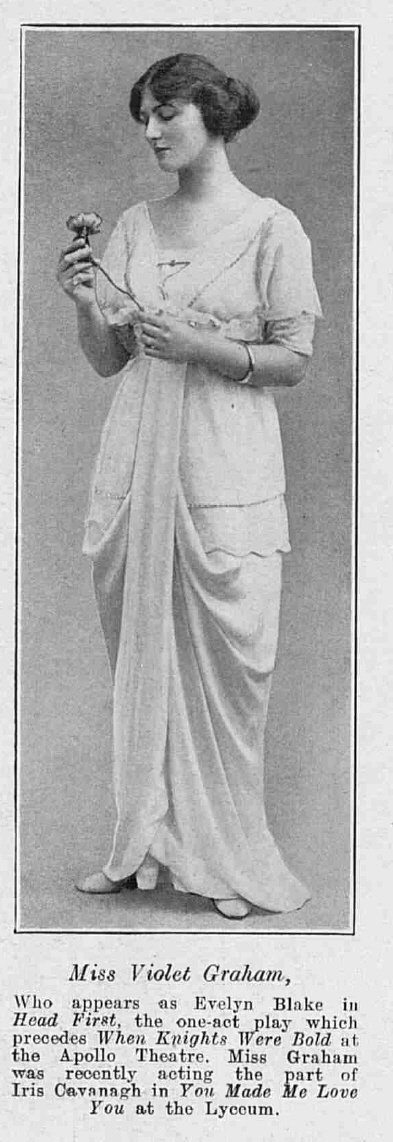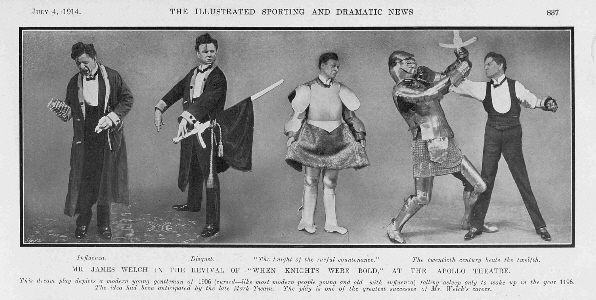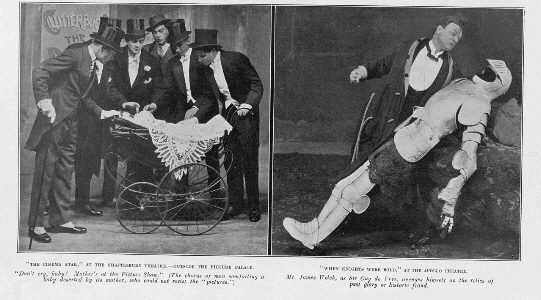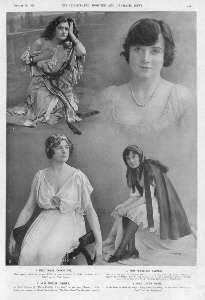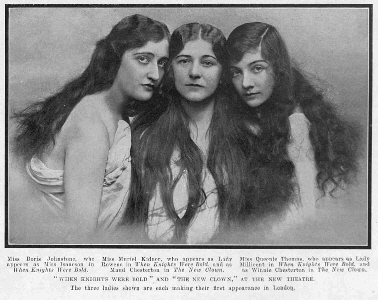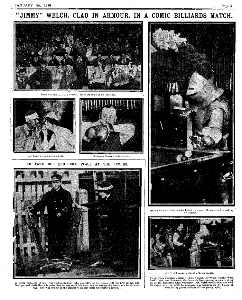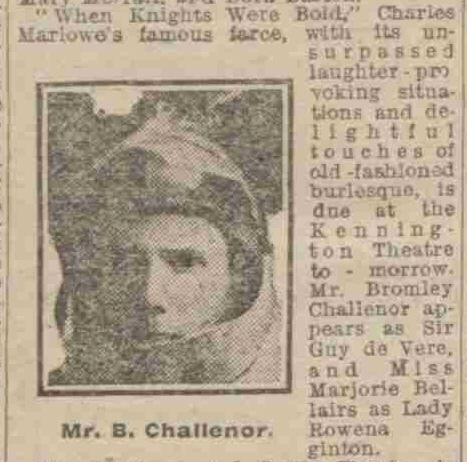|
Play List: 4. Corinne 7. The Mormons 9. Lucy Brandon 10. Storm-Beaten 11. Lady Clare 13. Bachelors 14. Constance 15. Lottie 16. Agnes 17. Alone in London 18. Sophia 19. Fascination 20. The Blue Bells of Scotland 21. Partners 24. Angelina! 25. The Old Home 26. A Man’s Shadow 27. Theodora 29. Clarissa 30. Miss Tomboy 32. Sweet Nancy 33. The English Rose 36. Marmion 37. The Gifted Lady 38. The Trumpet Call 39. Squire Kate 40. The White Rose 42. The Black Domino 44. The Charlatan 45. Dick Sheridan 47. Lady Gladys 48. The Strange Adventures of Miss Brown 49. The Romance of the Shopwalker 52. Two Little Maids from School ___ |
|
ROBERT WILLIAMS BUCHANAN (1841 - 1901) |
|
|
|
|
|
|
|
|
4. When Knights Were Bold - Reviews, etc. (3) |
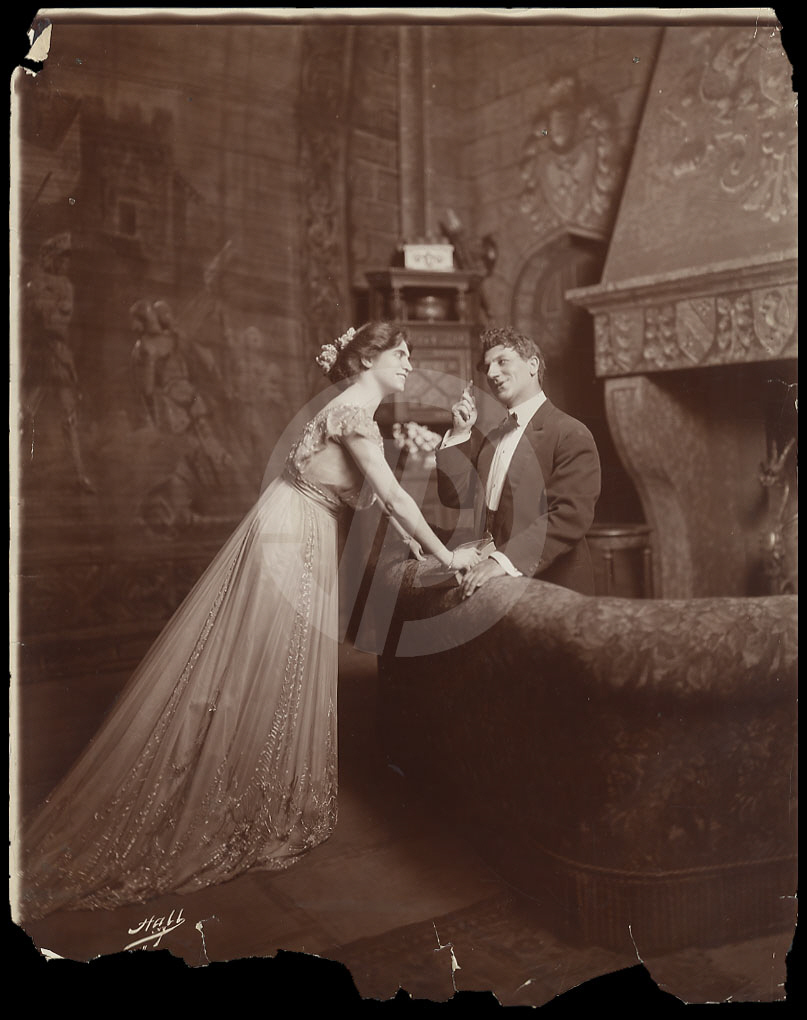 |
|
[Francis Wilson in When Knights Were Bold, and below, the reverse of the postcard.] |
|||
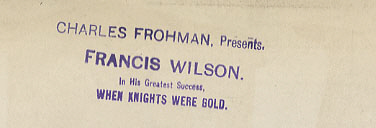 |
|||
|
Black and White (15 January, 1910 - p.88) ON Monday, January 10th, Mr. Rudolf Besier’s brilliant comedy Don celebrated its hundredth performance at the Criterion Theatre. So great is still the public demand to see Don that Mr. Herbert Trench has had to find another home for it when his tenancy of the Criterion expires. He has therefore decided to move it with the entire original company to the Kingsway Theatre on Monday next. Mr. James Welch is reviewing When Knights Were Bold at the Criterion, and the famous farce celebrates its 1,100th night. These Knights are worse than those of Arabia, a series that consisted of only one thousand. ___
Daily Express (19 January, 1910 - p.7) Mr. James Welch, who opened his season on Monday at the Criterion with the eleven hundredth performance of “When Knights were Bold,” has a few interesting notes on his royal and other patrons. ___
The Stage (20 January, 1910 - p.17) THE CRITERION. It is nearly three years since When Knights Were Bold received its London production at Wyndham’s, January 29, 1907. It ran for about a year at that theatre, and its revival in town has always proved acceptable to laughter-seeking audiences. Hence Mr. James Welch has done well in opening his season at the Criterion with “Charles Marlowe’s” fanciful, whimsical, and exceedingly funny farce showing a sort of reversion to the period and characters of “Ivanhoe.” In his old rôle of the extremely commonplace and essentially modern young baronet Sir Guy de Vere, transported in a dream 710 years back, from 1906 to 1196, Mr. Welch has still carte blanche to work his own mirth-provoking will with regard to the introduction of apparently new items of business, though, in deference to former statements that nothing in the original dialogue had been modified by the popular comedian, one must assume that the authoress of the farce, Miss Harriet Jay, is responsible for, or, acquiescingly cognisant of, such topical introductions as a Teddy-Bear allusion and make-up, a reference to Miss Maud Allan, and other things of a like nature. Elaborated, if not absolutely new, is some diverting monkey business for Mr. Welch, in the first act, and in the second, in particular, he causes Laughter to hold both his sides at Sir Guy’s perplexity at being taken back to the Good Old Times of Richard Cœur-de- Lion. But, indeed, Mr. Welch is in his characteristic and now somewhat highly coloured fashion immensely funny throughout the piece, which owes most of its long-continued success to his ingeniously amusing performance. Mr. Welch, on the present West-End revival, which opened most encouragingly on Monday, January 17, is supported by many members of the old cast, though there are a few notable changes. Miss Audrey Ford is as effectively and artistically intense as before in the mock-heroic vein as the romantic and mediæval-idead Lady Rowena, who forms such a contrast to her prosaic and slangy cousin. Much fun is once more caused by Mr. Guy Lane, Mr. Henry J. Ford, Mr. George F. Tully, and Mr. Gordon Tomkins, who re-appear, respectively, in the dual capacities of Dean and monk, modern punster and Old-Style jester, valet and retainer, and butler and seneschal. Miss Mabel Younge is at present the Hon. Mrs. Waldegrave, first played by Miss Emma Gwynne, the girls having attractive and lively representatives in Misses Maev O’Hea, Evelyn Cecil, and Peggy Kennedy. Miss Annie Chippendale is still a sprightly and vivacious Alice Barker, and Miss Daisy Cordell is again pleasantly and piquantly passionate as Sarah Isaacson. The latter’s scheming sire was originally played by Mr. Arthur Grenville, now appearing as Malvolio in Mr. Richard Flanagan’s Twelfth Night revival at the Queen’s Manchester, and the part is now acted on the accepted lines by that versatile player Mr. A. Clifton Alderson. A new Sir Brian Ballymote is that of Mr. H. K. Ayliff, who makes a good deal of his opportunities. Mr. Harry Agar Lyons is now the Herald, and the picturesque accessories and tuneful music of the scenes in the Good Old Times, capitally set forth with the aid of the minor members of Mr. Welch’s company, are further factors in the undoubted success of this revival of When Knights Were Bold. ___
The Illustrated London News (22 January, 1910 - p.2) “WHEN KNIGHTS WERE BOLD,” AT THE CRITERION. There are plays on which our public insists upon passing an independent judgment, and a case in point is “Charles Marlowe’s” droll farce, “When Knights Were Bold.” The piece is far happier in idea than in execution; the scheme was worthy of something much better than the conventional treatment given it by the author. To a dramatist of resource and historical instinct all sorts of delightful possibilities should open out at the moment he conceives the notion of plunging a modern weakling into the armour and the warlike atmosphere of mediæval times. Still, though “Charles Marlowe” has not made enough of her opportunities, she has devised a sufficient number of quaint situations to make her play one of the most popular of our day, and she has the advantage of finding in Mr. James Welch an interpreter whose unflagging spirits and comic energy have often made a poor play seem entertaining. Once more he reappears in the rôle of the degenerate Sir Guy, and makes his audience (at the Criterion) rock with laughter. Once more he has the assistance of Miss Audrey Ford and an adequate company, and once more it looks as if the piece were in for a long run. ___
The Sketch (26 January, 1910 - p.14) THE STAGE FROM THE STALLS. . . . “When Knights Were Bold.”
(p.18) |
|||
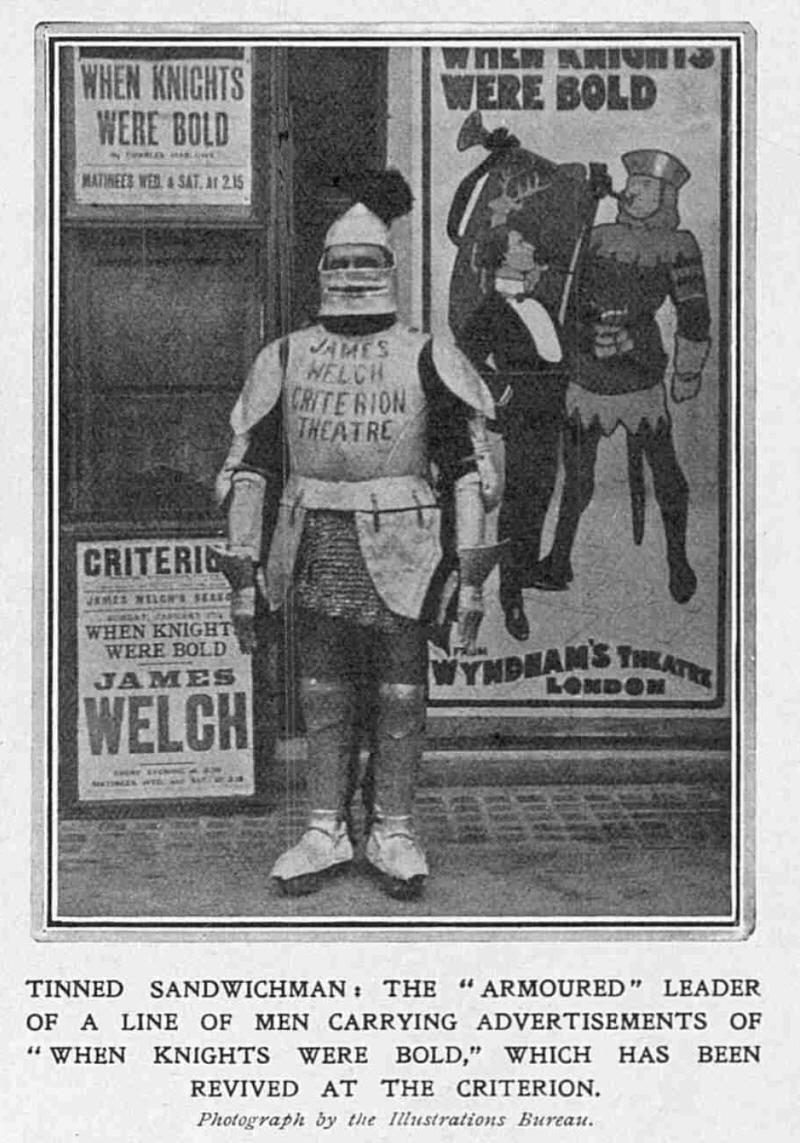 |
|
The Illustrated Sporting and Dramatic News (5 February, 1910 - p.7) An Italian version of When Knights Were Bold has been successfully produced at the Teatro Argentino, Rome. [Note: |
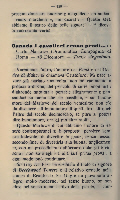 |
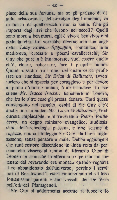 |
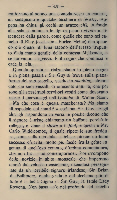 |
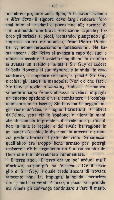 |
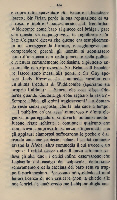 |
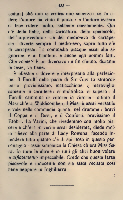 |
|
The Mercury (12 February, 1910 - p.3) On Monday evening “When Knights were Bold” was revived at the Criterion, and was received with shouts of mirth by a crowded house, glad to forget, for a while and wholeheartedly, the stress of politics. But the chief reason for the renewed success of Mr. Marlowe’s farce, was, of course, the return of James Welch to the London of which he seems so typical a product. Miss Audrey Ford is once again an excellent Lady Rowena. There seems no reason why “When Knights were Bold” should not go on playing for years. ___
Daily Express (16 March, 1910 - p.1) HUMOUR THAT FAILED. “WHEN KNIGHTS WERE BOLD” “Express” Correspondent. BERLIN, Tuesday, March 15. The play “When Knights Were Bold” was produced at the Neues Theatre here to-night without exciting any enthusiasm. ___
The Era (13 August, 1910 - p.11) DALSTON THEATRE. Mr. James Welch’s company is here with When Knights were Bold, and the house, which is filled with an appreciative audience every evening, rings with laughter. The scenery is admirably worked under the stage-management of Mr. Herbert Ranson. Sir Guy de Vere is represented by Mr. H. Langdon Bruce, who keeps the audience keenly amused. The actor goes through his trying part in a way that impresses onlookers with the idea that he is all the time thoroughly enjoying himself. Mr. Charles F. Lloyd’s Isaac Isaacson is a creditable study of a thoroughly up-to-date Israelite, and Miss Violet Noel, as the Jew’s daughter, gives an artistic representation. Mr. Percy R. Goodyer is decidedly “merry and bright” as the Hon. Charles Widdicombe, imparting considerable “go” to several scenes; Mr. Colin Johnson’s Rev. Peter Pottleberry, D.D., furnishes a careful study of quiet dignity and dry humour. Mr. Humphrey Warden struggles valiantly with the part of Sir Brian Ballymote. The Wittle of Mr. Lawrence Stevenson and the Barker of Mr. John Cecil are both capital character sketches. Miss Isla Glynne is a charming Lady Rowena Eggington, and Miss Lena Flowerdew, Miss Juliet Matheson, Miss Lee Lewis, and Miss Sadie Hope all appear to advantage. Miss Elspeth Oliphant acts with quite taking simplicity as Alice Barker, and Mr. Herbert Ranson does effective service as a Herald. The performance provides a delightful evening’s entertainment, and Mr. W. R. King, the acting-manager for the theatre, is kept busy finding room for the numerous applicants for admission. The chief piece of the evening is preceded by a comedietta, by Frank Howell Evans, entitled Milly’s Mother, in which the characters are ably sustained by Mr. Percy R. Goodyer, Mr. John Cecil, Miss Lena Flowerdew, and Miss Sadie Hope. ___
Daily Express (12 October, 1910 - p.7) Mr. James Welch is this week appearing to crowded houses in “When Knights Were Bold” at the Marlborough Theatre, Holloway. The piece has been given for 1,250 performances, and is still played to one prolonged roar of merriment. ___
Music Hall and Theatre Review (15 December, 1910 - p.10) Grateful for the Chance. Mr. James Welch is the “newest recruit to the variety stage,” if one must use the popular phrase. He is this week appearing at the London Coliseum in a playlet, entitled “The Man in the Street.” This is a clever study of a street musician, suddenly called upon to play the hero. It employs the very best of Mr. Welch’s art, recalling the days when he was looked upon as a fine character actor, rather than the popular hero of farce and comedy. “Sixteen years ago—nearly seventeen! Great Scott!” murmured Mr. Welch, and he shook his head gravely with a sigh of mock pathos. “I’m going to have a holiday after this production,” he said, “and then, some time in the spring, I hope to give a new piece.” ___
The Sketch (15 February, 1911 - p.15) |
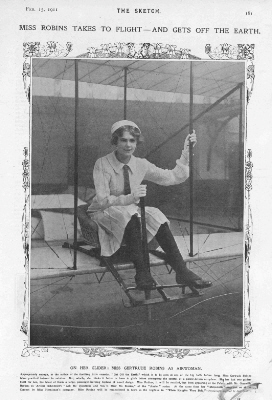 |
|
The Shoreditch Observer, Hackney Express, Bethnal Green Chronicle and Finsbury Gazette (18 November, 1911 - p.8) “When Knights Were Bold,” correctly described as “the funniest farce on earth,” is to be played at the Marlborough Theatre, Holloway, next week, with the distinguished comedian, Mr. James Welch, in the cast. |
 |
|
[Click picture for larger image.]
Daily Express (7 May, 1913 - p.9) NEW STORIES OF KING EDWARD . . . It will interest Mr. James Welch to know that after he had seen “When Knights Were Bold,” Mr. Stamper heard the King say, “Never laughed so much in my life.” |
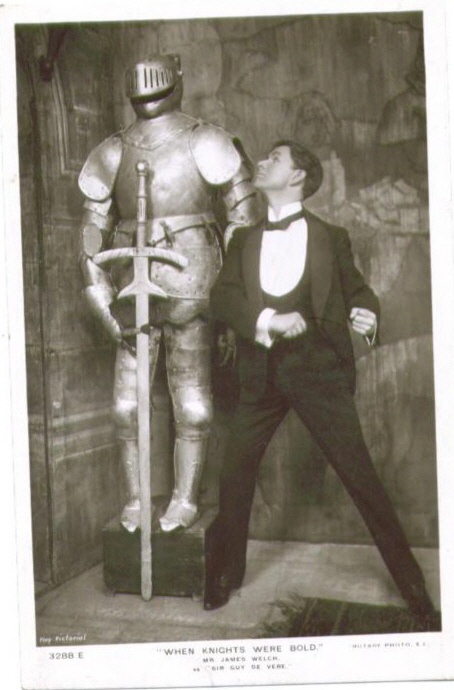 |
|
The Stage (18 June, 1914 - p.25) THE APOLLO “WHEN KNIGHTS WERE BOLD” REVIVED. On Thursday evening, June 11, 1914, was revived at the Apollo “Charles Marlowe’s” three-act farce entitled:— When Knights Were Bold. |
|
|
|
All those who are fond of genuine fun gained by legitimate, if at times artless, means will welcome Mr. James Welch’s revival at the Apollo of “Charles Marlowe’s” ever-enjoyable farce When Knights Were Bold, It is now some seven years ago since this bright and clever satire upon chivalry and pride of birth first set the playgoing world a-laughing and provided “Jimmy” Welch with one of his most popular parts; and, if one is to judge by the unrestrained and continuous mirth it provoked on Thursday evening among a large audience, it should retain all its essential vitality for many another seven years to come! The reason for this, of course, is that, as has been said, the fun of When Knights Were Bold is perfectly legitimate fun. Mark Twain discovered the fraud of mediæval chivalry many years ago in that most delightful of all his books “A Yankee at the Court of King Arthur”—one remembers Morgan Le Fay’s castle, where the band played what seemed to be the crude first-draft of “In the sweet by-and-by,” and the Queen had the composer hanged after dinner, with peculiar relish—while the gentleman who thinks that he is great because his grandmother was great is, like the poor, always with us! In fact, the theme of “Charles Marlowe’s” evergreen farce is so delightfully fruitful of possibilities that the piece might almost be said to have written itself, and it goes without saying that those interpreting it must of necessity be infected by its high-spirited gaiety. This is especially the case with Mr. James Welch as the irrepressible Sir Guy de Vere, a part he plays with all his accustomed animation of style and gesture. Whether as the romp in the first act, with a “code id his dose,” the valiant fighting man in the second, or the apparently insane person in the third, the popular comedian carries all before him, and shows not a trace of his recent regrettable indisposition. Miss Isla Glynn, on the other hand, is a charmingly demure Lady Rowena, being particularly successful as the white-robed novice in the second act; while it would be difficult to find a better or more attractive Sara Isaacson than that of Miss Muriel Kidner—a remark which also applied to the taking Alice Barker of Miss Violet Graham. Mr. C. F. Lloyd as the Jew, Isaac Isaacson; Mr. George Desmond as that notable “silly ass,” Charles Widdicombe; Mr. Colin Johnstone as a lifelike Dr. Pottlebury; Mr. Denis J. Hogan as the scheming Sir Brian; Mr. Stanley Yourke as a capital Wittle; Mr. George Child as an amusing Barker; Mr. Herbert Ransom as the Herald; and Miss Mabel Younge as the Hon. Mrs. Waldegrave are all admirably in the picture, the cast being cleverly completed by Miss Peggy Kennedy as Lady Millicent, Miss Queenie Thomas as Lady Marjorie, and Miss Stephanie Bell as Kate Pottlebury. In response to loud demands for a speech on Thursday evening Mr. Welch stepped forward and said “Dear Boys and Girls, thank you so much. It is so nice to be with you all again”—a sentiment which should be uppermost at the Apollo for many weeks to come. ___
The Illustrated London News (20 June, 1914 - p.2) “WHEN KNIGHTS WERE BOLD,” AT THE APOLLO. When a piece has reached its two-thousandth performance, as “When Knights were Bold” did on Thursday of last week—on which occasion Mr. James Welch revived it at the Apollo—any comment on either its merits or its demerits is surely superfluous. It is enough to say that the popular comedian was warmly received on making his reappearance in London as the bewildered knight, Guy de Vere, and that among the company which helped to render “Charles Marlowe’s” farce once more acceptable were Miss Stephanie Bell and Miss Isla Glynn. Obviously its attractions have far from waned. ___
The Illustrated Sporting and Dramatic News (20 June, 1914 - p.15) “WHEN KNIGHTS WERE BOLD.”—This is one of the popular successes, the reason for which can be stated with confidence and in two words. The words are James Welch. Of course, we have to thank the author, “Charles Marlowe,” for having refrained from adapting from the French, and for having shown that you can on occasion make merry with other subjects than adultery; but I should be nervous about When Knights Were Bold if Mr. Welch were not the Knight. He returns to the stage as light-hearted as ever. he sneezes and he snuffles and he capers about the sofa, and he scatters mustard and spills the whiskey, and larks with the armour and treats the middle ages with contempt. Any happy thought that comes into his head he raps out on the moment, whether it be suitable to the occasion or not, and whatever he does or says is right, for he has the gift and the charm of complete spontaneity. In the play he has to be, and, in fact, he is, a large—and indeed a not so very large—baby just out for a holiday, and letting itself go in a riot of sheer nonsense, and he manages to make everybody else as happy as he seems to be himself. To ask why he is funny where another would be merely tiresome would be as futile as to question why a rose smells like a rose. It is in the nature of Mr. Welch to be supremely funny, and there’s an end of it. Our stage is very much the richer for his return, and he was probably wise in choosing When Knights Were Bold with which to begin. It is neat and it is English, and it is a very cheery piece of nonsense over which to spend a merry evening. There is little in it for anybody but Mr. Welch to do, but I fancy that there will be very little complaint about that—except perhaps among the others who have so little to do. ___
The Illustrated Sporting and Dramatic News (27 June, 1914 - p.24) |
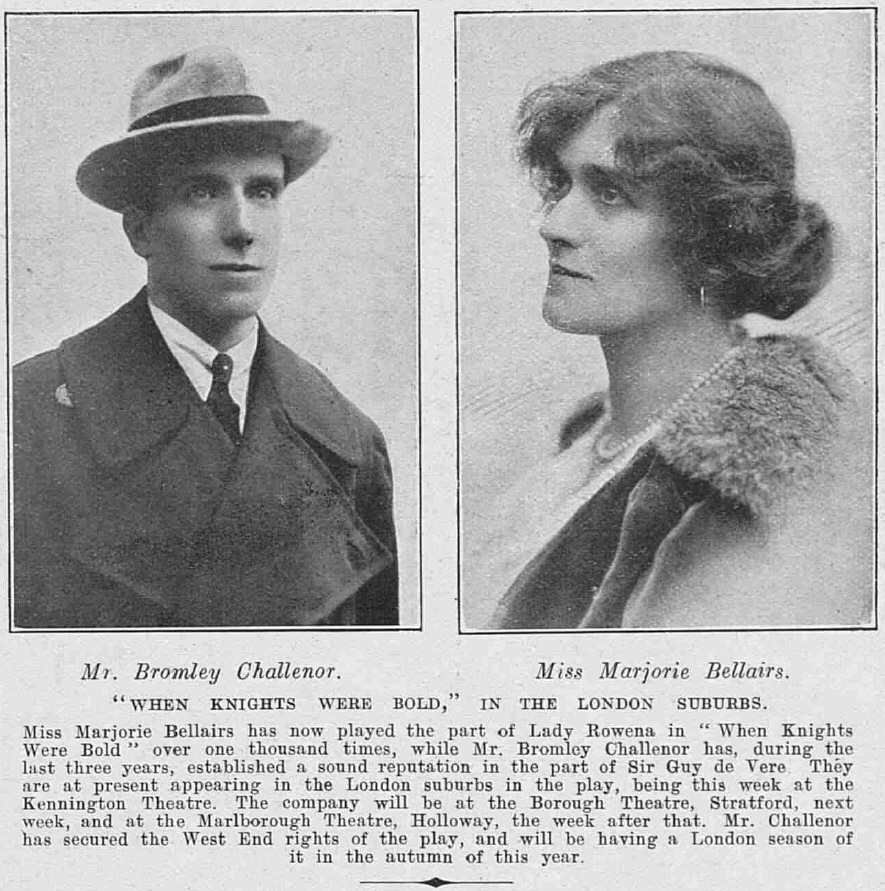 |
|
Daily Express (Thursday, 12 April, 1917 - p.3) DEATH OF JAMES WELCH. ACTOR OF INIMITABLE PATHOS AND HUMOUR. Mr. James Welch, the actor, died on Tuesday night at Ringwood, New Forest, after a lingering illness. His age was fifty-two, and he had been thirty years on the stage. He will be deeply regretted, both for his fine personal qualities and for his great talents as a comedian. ___
The Sketch (18 April, 1917 - p.34) |
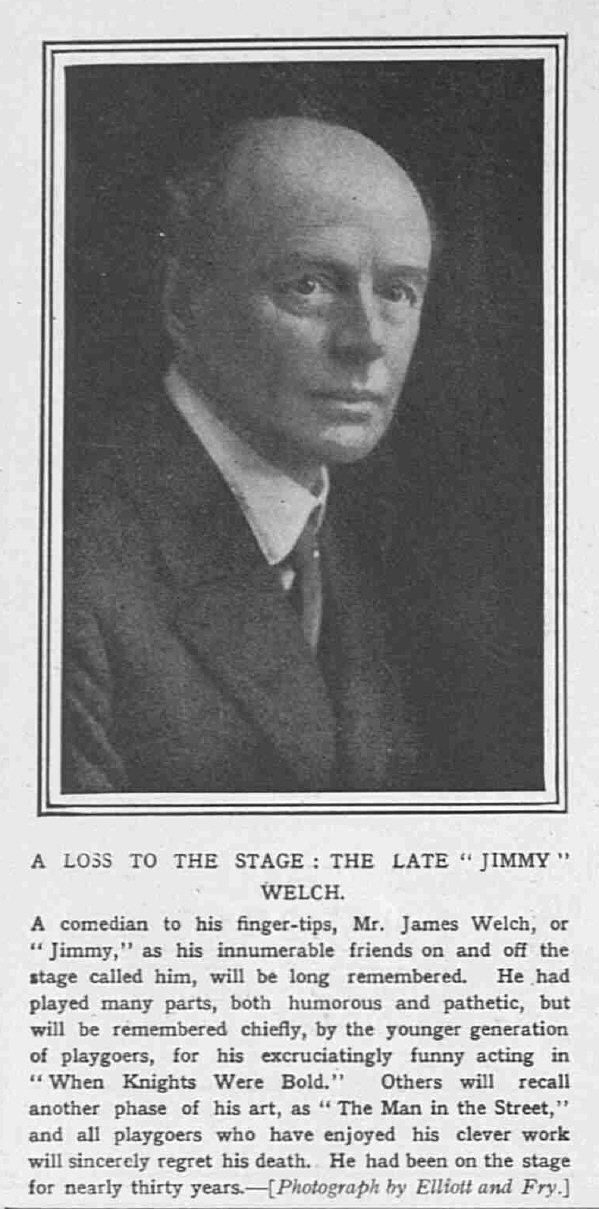 |
|||
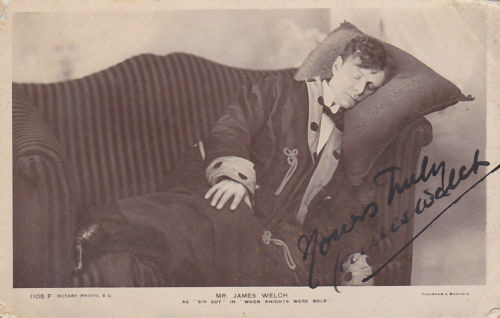 |
|||
|
The Stage (15 November, 1917 - p.14) “When Knights were Bold.” The only change of bill in the West End this week will be the revival on Saturday afternoon, at the Kingsway, of “When Knights were Bold.” Ever since its production at Wyndham’s on January 29, 1907, Harriett Jay’s farce has enjoyed an immense amount of popularity, and has had several revivals in London. Criterion, January 17, 1910; Apollo, June 11, 1914; New, February 8, 1915. The popularity of the piece in the provinces as well as in London was, of course, largely due to the highly comic interpretation of the character of Sir Guy de Vere by the late James Welch. Mr. Welch played the part continuously from January, 1907, until July of the following year, and he subsequently went on tour, acting the character, almost without a break, for the next three years. Mr. Bromley Challenor, who will be the Sir Guy at the Kingsway, has appeared in the character for one thousand five hundred times. Miss Marjorie Bellairs will be the Lady Rowena. ___
[After the death of James Welch on 10th April 1917, Sir Guy de Vere’s armour was passed on to Bromley Challenor, who continued to play the role until 1932. Obituaries of both actors and the report of a 1917 court case over the rights to the play, are available in the When Knights Were Bold - Miscellanea section.] ___
The Times (19 November, 1917 - p.11) “WHEN KNIGHTS WERE BOLD.” SUCCESSFUL REVIVAL AT THE BY CHARLES MARLOWE. |
|
|
|
It might perhaps have been thought that When Knights were Bold would hardly have survived Mr. James Welch, so dependent did it seem to be upon his peculiar personality and impish fun. But it is as true on the stage as elsewhere that il n’y a pas d’homme nécessaire, and Mr. Bromley Challenor, though he is not Mr. Welch, has a personality and a fun of his own, enough at any rate to keep the farce moving and the audience laughing. Indeed, the audience on Saturday was so obliging as to laugh loudly not only at the old jokes but at the rough-and-tumble tomfoolery—a circumstance which, however it might puzzle the philosophers from Hobbes to Bergson who have analysed laughter, undoubtedly justified the revival of the farce. ___
The Stage (22 November, 1917 - p.18) THE KINGSWAY. “WHEN KNIGHTS WERE BOLD” REVIVED. There has been another change of bill and of management at the house in Great Queen Street, which was re-opened on Saturday, November 17, by Mr. Bromley Challenor, with a welcome and apparently acceptable revival of that piece admirably calculated to drive away dull care, “When Knights were Bold.” Mr. B. Challenor, whose business manager at the Kingsway is Mr. Yourke Challenor, has had a lengthy and successful association with this popular farce of “Charles Marlowe” (Harriett Jay), for he has been touring for a considerable period with this quasi-burlesque of “Ivanhoe,” and has, we understand, appeared as many as 1,500 times in the late James Welch’s old rôle of Sir Guy de Vere. That very modern and ultra-slangy descendant of the doughty Knights of Beechwood Towers is played, with some of the familiar “Jimmy Welch” tones and attitudes , by Mr. Bromley Challenor, but also with many original touches and diverting bits of acrobatic or semi-pantomimic bits of business, as well as with the introduction of numerous topical hits, such as references to Tanks, the Entertainments Tax, Sugar Cards, and so forth. This may be held justifiable in the case of an old favourite that has been played as frank farce for years past, although on the present revival the romantic element, which forms the all-important factor of designed contrast, has by no means been slurred over. Mr. B. Challenor is thus showing himself to West End audiences to be an energetic, adroit, and well-equipped comedian, and, besides giving a genuinely successful impersonation of Sir Guy, he is to be credited with the excellent and carefully-controlled production of the play, with the aid of the stage management of Mr. S. J. Chapman, who also makes a picturesque and stalwart exponent of the Herald. The effect of the ensemble is enhanced by the painstaking rendering of the vocal items and by the duly old- time costumes and accessories. ___
The Illustrated London News (24 November, 1917 - p.34) “WHEN KNIGHTS WERE BOLD,” AT THE KINGSWAY. THE most obstinate success of its day, “When Knights were Bold,” is associated unforgettably with the memory of James Welch. His performances in the rôle of that irresistible though timorous Knight, Sir Guy de Vere, must have run into four figures. But though he, alas! is no longer at hand to interpret its humours, “Charles Marlowe’s” farcical fantasy was much too entertaining a thing to keep on the shelf, especially as we can rely on the services of a comedian who even in Mr. Welch’s lifetime challenged comparisons in the part and acquitted himself well. Mr. Bromley Challenor and his supporters, encouraged by the golden opinions they have won in the provinces and the outer ring of London, have now moved into the West End, with the result that the theatre of their choice, the Kingsway, becomes once more a home of mirth. Mr. Challenor obtains the best of female backing from Miss Jean Charteris and Miss Marjorie Bellairs. So that the revival gives every promise of enjoying a good run. ___
The Illustrated Sporting and Dramatic News (24 November, 1917 - p.14) “WHEN KNIGHTS WERE BOLD.”—I looked in for a while at the Kingsway last week and found a new Sir Guy de Vere frolicking where once frolicked Mr. James Welch. It was Mr. Bromley Challenor, who occasionally recalled the great original in voice and manner—probably nobody could help doing that—and for the rest had his own ideas of the part. They were laudable, but uninspired. It was what I may call fair No. 1 Touring Company work. With Mr. Welch away the little farce is a reasonably effective method of getting laughter by simple means. Spilling the mustard intended for the bath is now a more prominent feature than the character of Sir Guy; and the rest of the play has developed, as might be expected, on the same lines. It had shown a tendency to that direction while Mr. Welch was alive; but there was real character in little Sir Guy then. It was not merely that he has a very good imitation of a bad cold in the head, or got simple effects from the contrast between a young man in evening dress and the inhabitants of a mediæval castle. He jumped about the furniture and made great play with early blank verse, and wrestled with Isaac of York and flirted with the kitchen wench, and caused much amusement thereby; but that was not by any means the whole of the story. Mr. Welch was wistful and vividly alive, and had in his being a curiously tender humour which bubbled over spontaneously and irresistibly; and these things, and not horseplay, were the making of “When Knights were Bold.” However, it is not fair when considering Mr. Challenor to contemplate exclusively memories of Mr. Welch. It is the sort of thing that happens on the first occasion when a play is seen without the player who made it; and it is perhaps inevitable. It is a risk which his successor has to face; and by bringing his company to London Mr. Challenor challenges the comparison, and is no doubt prepared to face it. But I am afraid that he will not gain much by doing so. This rendering of the play will no doubt do well enough where Mr. Welch was never seen. It is full of energy and all the usual points are made. It wins much laughter—particularly that mustard incident, which is rendered the more acutely humorous by much spilling of whiskey; and Mr. Challenor himself does everything that is necessary for an unsophisticated romp. But it is, after all, a touring affair, and nothing that he or his company do can hide that fact. It is a thing for conventional phrases of polite praise. ___
The Sketch (28 November, 1917 - p.34) THINGS NEW: AT THE THEATRES. THE revival of “When Knights Were Bold,” at the Kingsway Theatre, reminds one sadly of the death of poor “Jimmy” Welch, a brilliant actor, whose career is a curious instance of waste; for he was generally engaged in parts which gave nothing like full scope to his remarkable gifts, though it must be added that he played them better than anybody else. Miss Harriet Jay’s simple farce, now nearly eleven years old, was, of course, a case in point: he got a great deal out of its simple humours, and added no little to them by his peculiar gifts, wherefore he was able to give immense enjoyment to a host of playgoers; but one can wish he had been employed in finer work. “When Knights Were Bold” is well chosen for revival at present: it is free from the offence found in several classes of farce, and full of fun for those who want to laugh without knowing why. There is even a kind of curious modernity, due to the strange return to armour in latter-day fighting. No need to make comparisons between present and former casts. Mr. Bromley Challoner, in the part of Sir Guy, plays cleverly with abundant energy, and earns lots of laughter. |
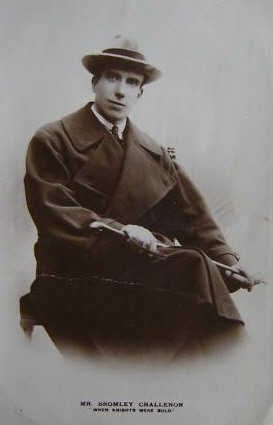 |
|
[Mr. Bromley Challenor.]
Daily Express (10 March, 1920 - p.5) “WHEN KNIGHTS WERE BOLD.” Mr. Bromley Challenor, of the Scala Theatre, who has gained such renown for his performance of Sir Guy de Vere in “When Knights Were Bold,” is not the Mr. Frank Stanley Bromley-Challenor who was mentioned in the Divorce Court on Monday last. ___
The Derby Daily Telegraph (19 June, 1920 - p.2) AMUSEMENTS IN DERBY. GRAND THEATRE. That funniest of all farcical comedies, “When Knights Were Bold,” will pay another visit to the Grand Theatre next week. The play is one of those evergreens that always retain popularity, for in spite of the years that have elapsed since James Welch first took London by storm as Sir Guy de Vere, “When Knights Were Bold” is as popular as ever it was. In next week’s production Mr. Guy Basil will play Sir Guy de Vere, the diminutive baronet who dreamt that he lived 723 years ago, and Miss Maisie Stuart makes a delightful heroine as Lady Rowena Eggington. The supporting cast is a very strong one, the play being produced by Mr. Bromley Challenor, who, it will be remembered, appeared several times in Derby in this and other productions. Mr. Challenor is now taking the place of the late lamented Mr. Welch on the London stage, where the play has enjoyed a practically continuous run since its inception. ___
The Times (29 June, 1920 - p.14) SUMMER PLAYS IN BERLIN. REIGN OF FARCE. . . . Yet mediocre as is much of the summer fare provided, the opening of the season in Berlin has been greeted with remarkable enthusiasm in many theatres, and numerous triumphs have been scored. They are chiefly the individual triumphs of a few footlight favourites, and it says much for their art and their temperament that they have succeeded in winning over a hypercritical public frequently in spite of the poor standard of play in which they have been employed. Much of the acting is undoubtedly first-rate, and one can see these popular mirth-provokers in a great variety of German and foreign pieces, among which an ever-increasing number of English comedies are being revived. THE ENGLISH VOGUE. For the time has returned when your Berliner, discreetly forgetting that he ever uttered a “Gott strafe England,” washes again with English soap, cultivates an English vocabulary, and laughs again over Arms and the Man, Charley’s Aunt, and The Importance of Being Earnest. German critics never tire of gibing at the type of stage wit they consider specifically English—the humour still mainly connected with the Briton who boxes, chews an enormous pipe, mouths his words, drinks whisky-soda, and makes wagers about everything. But critics are inhuman beings the world over; and the Briton arriving in the German capital to-day may derive a degree of consolation from finding English comedies attracting big and appreciative audiences in half a dozen different playhouses nightly. |
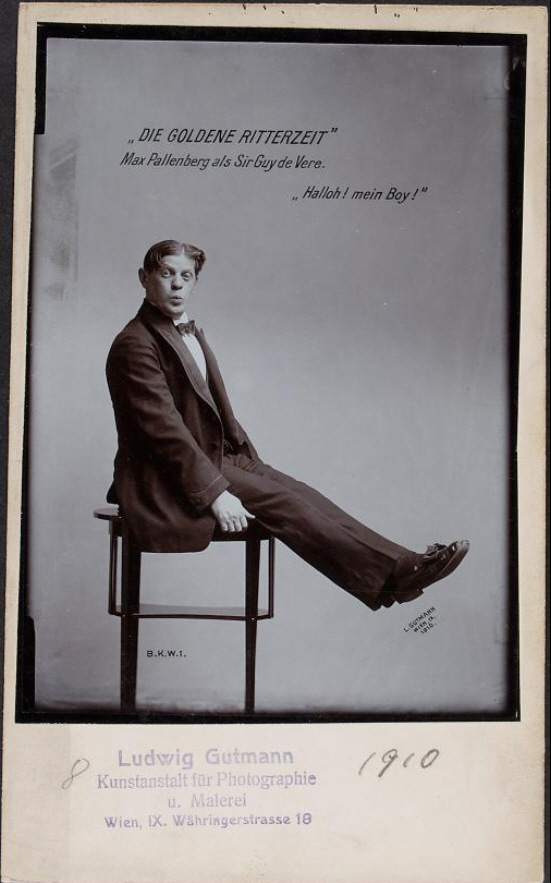 |
|
The Daily Mail (28 September, 1920 - p.5) MR. JAMES WELCH’S ARMOUR. Armour worn by the late Mr. James Welch in “When Knights were Bold” was valued with stage furniture as a £10 asset at the London Bankruptcy Court yesterday when creditors met under a receiving order made against Mr. James Bromley Challenor, actor and theatrical manager, of Porchester-gardens, Bayswater, W. ___
The Daily Herald (28 September, 1920 - p.2) SHINING ARMOUR Looked All Right, But Held The creditors of Mr. James Bromley Challenor—who perpetrated the success achieved by James Welch in that popular play “When Knights Were Bold”—met at the London Bankruptcy Court yesterday under a receiving order against the well-known actor. ___
The Globe (8 December, 1920 - p.3) A Romantic Drama ___
The Daily Herald (9 December, 1920 - p.2) PLAYS THAT DIDN’T PAY Mr. Bromley Challenor’s The examination was concluded at London Bankruptcy Court yesterday of Mr. James Bromley Challenor, actor and theatrical manager, who had lodged a statement of affairs showing liabilities of £4,419, and assets valued at £142. ___
The Times (11 December, 1920 - p.8) “WHEN KNIGHTS WERE BOLD.” Revivals of farcical comedies, with thousands and thousands of past performances as their guarantee to amuse, are becoming a popular feature of the Christmas entertainment season. When Knights Were Bold, presented at the Duke of York’s Theatre last night, is not of the oldest vintage, but it has a lengthening record of success, and with a bad cold and the “good old days” as leading themes it seems peculiarly suited to appeal to audiences at this time of the year. Mr. Bromley Challenor is again the Sir Guy de Vere of the play, and is excellent all through. The character rather lends itself to “gagging,” and Mr. Challenor falls before temptation, but without spoiling his effects. Mr. Sydney Paxton and Miss Madge Compton are prominent for good work among the other members of the company. ___
The Times (20 December, 1921 - p.8) “WHEN KNIGHTS WERE BOLD.” REVIVAL AT THE KINGSWAY. So many modern audiences have seen this play and made their comments upon it that the Lady Rowena, charming though she is, can no longer be allowed a monopoly in romance and miracle. He must face an Elizabethan audience; she—with a blessing upon the change in manners that changed the sex of her impersonator—must win the ear that attended Wycherley and look out an instant across the blur of periwigs that bobbed to the wit of Sheridan. Allow to these ghostly audiences that knowledge of topical allusions which we ourselves possess; preserve in them no strangeness but the strangeness of their own critical spirit. What then would they have said of this play that fills a theatre year by year, of Mr. Bromley Challenor’s untiring energy, of the Jester, the jousting, and the Jew? Would they have sat stolid and amazed? Would they have laughed? Would they have early departed? ___
The Stage (22 December, 1921 - p.16) THE KINGSWAY. “WHEN KNIGHTS WERE BOLD.” Harriet Jay’s long-popular piece bobs up serenely nearly every Christmas season, and this year its local habitation is to be found at the Kingsway, where it is being presented, twice daily, by Mr. W. A. Evans. Mr. Bromley Challenor resumes, for the nth time, his pleasantly familiar rôle of Sir Guy de Vere, to a new Lady Rowena in that of Miss Enid Cooper, a niece of Miss Margaret Cooper, it is stated, who is pretty, graceful, and charming, and plays with much spirit in the, as ever, picturesquely presented second act, on the Battlements, A.D. 1196. Herein Mr. Challenor, who has abated nothing of the acrobatic exploits and really “monkey tricks” that have latterly marked his side-splitting embodiment of Sir Guy, is notably good in showing the baronet’s passing from the manners of modern days into the true mediæval atmosphere, and he thus continues to differentiate skilfully his performance from that given of old by the late James Welch. The company now supporting Mr. Challenor include several members long conversant with their rôles, Mr. G. F. Lloyd, for instance, presenting a by no means conventionally Hebraic assumption of Isaac Isaacson, whose daughter, Sara has an exponent new, we think, in Miss Doris Johnstone, notably good in the attempted love-making with Sir Guy and as the captive with dishevelled hair of “Ye Goode Olde Times.” Mr. Dennis Wyndham makes once again a specious and sufficiently truculent personage of Sir Brian, worsted so ignominiously in the combat with the at last roused descendant of the de Veres; Mr. George Childs begins by being quietly demure as the Peter Pottlebury of the present time; and capital and genuinely diverting work is done in the contrasted phases of their rôles by Mr. Leslie Francis, especially funny when Charles Widdicombe becomes the family jester; by Mr. George Fytche as Barker, butler, and Seneschal, and by Mr. R. Tippett as Wittle. The Herald is embodied befittingly by Mr. David Kemp, stage manager for Mr. Evans, whose general manager is Mr. Archie W. Chappell. Miss Violet Ellicott is seen again as a stately and imposing Mrs. Waldegrave, the impersonation of the Abbess being particularly excellent; Lady Millicent and Lady Marjorie have agreeable exposition from Misses Joan Charteris and Leslie Birks; and Kate Pottlebury and the coyly amenable Alice Barker are also represented pleasantly by Misses Sheila Birks and Ruby Warneford. Brigata Bucalossi’s tuneful music makes the due effect in the ensemble of this merry farce as rendered by the orchestra under the direction of Mr. J. H. Squire. |
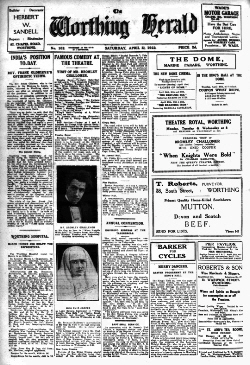 |
|
[The front page of The Worthing Herald of 22nd April, 1922, featuring an article about Bromley Challenor’s visit to the town with “When Knights Were Bold” and also a review of Fred Paul’s film version of The Lights of Home. The latter was showing at Worthing’s Dome Cinema, which, I’m happy to report, is still in business.] ___
The Times (19 December, 1923 - p.8) “WHEN KNIGHTS WERE BOLD.” REVIVAL AT THE CRITERION. When Knights Were Bold seems by now to have become the hardiest of all our “hardy annuals” at Christmas time, and this year Charles Marlowe’s farcical frolic is again as full of life as ever, in spite of its advanced theatrical age. When Mr. James Welch died it was promptly assumed that When Knights Were Bold would die with him, but at once Mr. Bromley Challenor came along, showed that he could worthily wear the preposterous armour that Mr. Welch had discarded, and made a new success of what had seemed to be a played-out part. ___
Programme for the Criterion Theatre, December, 1923. ___
The Tech (Massachusetts Institute of Technology newspaper Vol. 44, No. 30: 29 May, 1924 - p.4) DELIGHTFUL COMEDY AT Mr. E. E. Clive, playing the part of “Sir Guy De Vere,” the happy and care-free heir to the De Vere estates, is the factor in making the presentation of the charming little farce “When Knights Were Bold” at the Copley Theater this week, one of the most delightful comedies seen in Boston stock productions for quite a while. The play is in three acts and is written by Charles Marlowe. _____
5. When Knights Were Bold - Reviews, etc. (1925-1953) or back to When Knights Were Bold main menu
|
|
|
|
|
|
|
